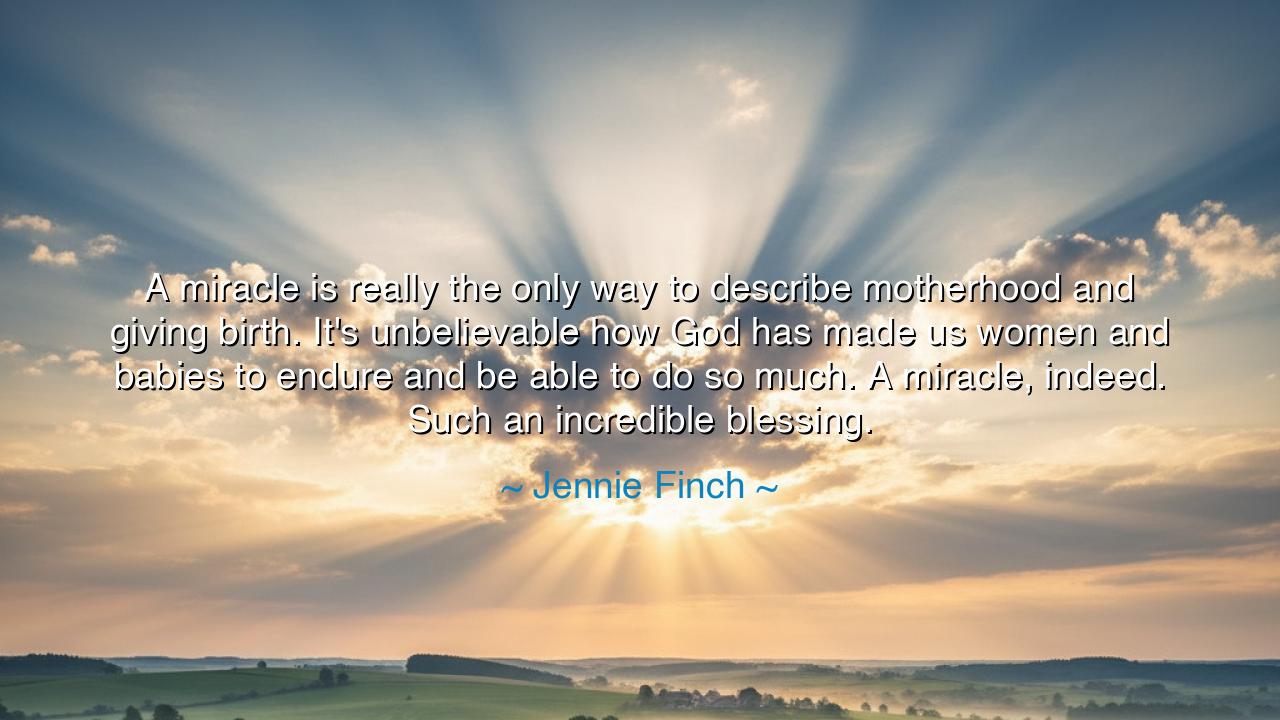
A miracle is really the only way to describe motherhood and
A miracle is really the only way to describe motherhood and giving birth. It's unbelievable how God has made us women and babies to endure and be able to do so much. A miracle, indeed. Such an incredible blessing.






O children of the future, hear now the words of Jennie Finch, who, with the eyes of a mother and the heart of a poet, spoke of the sacred and miraculous nature of motherhood. “A miracle is really the only way to describe motherhood and giving birth,” she said, for indeed, to bring life into the world is an act that defies the laws of nature, an act that echoes the divine. The very essence of creation is held within the woman, whose body bears the weight of life itself, and whose spirit is both the vessel and the guide for the soul of a new child. It is a gift from the heavens above—a blessing beyond measure.
In the sacred stories of the ancients, we learn of the goddesses who gave birth to worlds, who brought forth life from the very earth itself. In the tales of Hera, queen of the gods, we find the mystery of childbirth woven into the fabric of the cosmos. She, a goddess of creation and nurturance, knew that the power to bring forth life was not simply a matter of the body, but of the soul—a bond that connects mother and child in the deepest of ways. The miracle of childbirth transcends the physical realm, for it is an act of pure magic, of divine will made manifest in the world of men.
And so, O heirs of wisdom, let us reflect upon the strength and grace that a mother embodies. Just as Hannah, in the sacred texts, prayed for a child, and the heavens answered her prayers with the birth of Samuel, so too do women endure the trials of motherhood. The pain of birth, the weight of responsibility, and the fierce love that follows—these are the marks of a mother's journey. In every age, there are those who rise from the trials of birth to become the protectors of their children, the teachers, the warriors of life.
There is no greater example than that of Mary, the mother of Jesus, who gave birth to the savior of mankind. Her journey was one not only of physical endurance, but of spiritual strength—holding within her the promise of a future beyond her understanding. It is said that she did not know the full extent of the miracle she bore, yet she carried the weight of the world with a quiet, steadfast faith. Her story, as with all stories of motherhood, reminds us that the true miracle is not in the act of giving birth alone, but in the love and sacrifice that follows it.
And so we see, O children, that the miracle of motherhood is not confined to a single moment. It is a gift that flows through time, from generation to generation. It is the strength to endure, the grace to nurture, and the blessing to give life. As Jennie Finch so beautifully spoke, it is indeed a miracle—an incredible blessing that humankind has been granted. And in this, we are reminded of the divine nature that resides in each woman, and in the sacred bond between mother and child.






DTNgu Van 8 Doi tuyen
Jennie Finch’s description of childbirth as a miracle is heartwarming, but it raises a question: by emphasizing the miracle of motherhood, do we sometimes overlook the complexities and challenges of being a mother? How do we balance celebrating the beauty of life with acknowledging the real struggles that come with raising children? How can we create a more supportive environment for mothers while still recognizing the miraculous nature of what they do?
NTLe Thi Ngoc Truc
The way Jennie Finch speaks about motherhood as a miracle brings a sense of awe and reverence to the experience. But it also makes me ask: are we doing enough to ensure that women are supported through this miraculous journey? Shouldn't society recognize the physical, emotional, and mental demands of motherhood? While it's undeniably a miracle, how can we make sure that women don't feel isolated or overwhelmed in the process?
PLTran Phuong Linh
Jennie Finch’s perspective on motherhood as a miracle is beautiful, but I wonder if it sometimes places too much pressure on women. Does calling motherhood a 'miracle' imply that women should always handle it with grace and ease, even when it’s incredibly difficult? How can we ensure that the miracle of motherhood doesn’t overshadow the need for empathy, support, and the recognition of the tough realities many women face during this journey?
XNNguyen Xuan Nghi
I absolutely agree with Jennie Finch that motherhood and childbirth are truly miraculous. But it also makes me think about how we often idealize the experience without acknowledging the struggles women face during and after pregnancy. How do we shift the narrative from just celebrating the miracle of birth to recognizing and supporting the emotional and physical challenges that come with it? Can we truly celebrate the miracle without addressing the realities of motherhood?
PUTran Phuong Uyen
Jennie Finch's description of motherhood and childbirth as a miracle resonates deeply. It makes me reflect on how often we take for granted the strength and resilience that women display in the process of bringing life into the world. But, in today's society, are we equally acknowledging the challenges and pressures that come with it? Is it enough to call it a 'miracle,' or should we also focus on supporting women through the difficulties of motherhood?